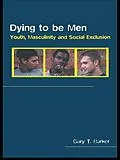Worldwide data on violence confirms that young men are the commonest perpetrators and recipients of violence, ranging from homicide to lesser forms of violence such as assault and delinquent behavior. Among young men in North and Latin America the incidence of violence, and homicide, is the highest in the world. Largely urban-based, the violence is clearly related to social exclusion, unemployment, and curtailed educational opportunities, although the versions of male identity prevailing in this context also appear to play a very large part in supporting and encouraging the use of violence, especially against women. The health consequences, and financial cost, of violence are considerable.
At the same time, despite the general acceptance of a traditional and callous version of manhood in such settings, there are young men who do not get involved in violence - the 'peace boys'. How can this be explained?
Based on field research and interviews in the USA and Brazil, "Dying to be Menexplores how manhood or male identity is shaped in poor urban settings, how it is that some young men resist the prevailing norms, what the implications are for social policy and what are the most important forms of intervention.
Autorentext
Gary Barker is Chief Executive of Instituto Promundo - an NGO based in Rio de Janeiro, Brazil, working in gender equality, violence prevention, HIV/AIDS and youth development. He has coordinated research and program development on the socialization of young men in Latin America, the Caribbean, Africa, Asia and North America, in collaboration with international and national organisations. This book is based on nearly 10 years of field work with young men in Brazil, the Caribbean, and the USA and parts of Sub-Sahara Africa, including the author's direct work with young men in these settings in collaboration with governments and NGOs.
Zusammenfassung
One of the first comparative reflections of its kind, this book examines the challenges that young men face when trying to grow up in societies where violence is the norm. Barker, who has worked directly with low-income youth and witnessed first hand the violence he describes, provides a compelling account of the young men's struggles. He discusses the problems these men face in other areas of their lives, including the difficulty of staying in school, the multiple challenges of coming of age as men in the face of social exclusion, including finding meaningful employment, and their interactions with young women, including sexual behaviour and the implications of this for HIV/AIDS prevention. The book presents examples of evaluated programs that have been able to aid young men in rethinking what it means to be a man and ultimately focuses on 'voices of resistance' - young men who find ways to stay out of violence and to show respect and equality in their relationships, even in settings where male violence and rigid attitudes about manhood are prevalent.
Inhalt
1. Why the Worry about Young Men? 2. Are You a Hippy or a Kicker?: A Personal Story and a Way of Understanding Manhood 3. Don't Worry, I'm not a Thief: The Story of Joao 4. The Trouble with Young Men: Coming of Age in Social Exclusion 5. In the Headlines: Interpersonal Violence and Gang Involvement 6. No Place at School: Low-Income Young Men and Educational Attainment 7. If You Don't Work, You Have to Steal: Low Income Young Men and Employment 8. In the Heat of the Moment: Relating to Women, Having Sex 9. Learning to Live with Women, Becoming Fathers 10. Dying to be Men, Living as Men: Conclusions and Final Reflections
